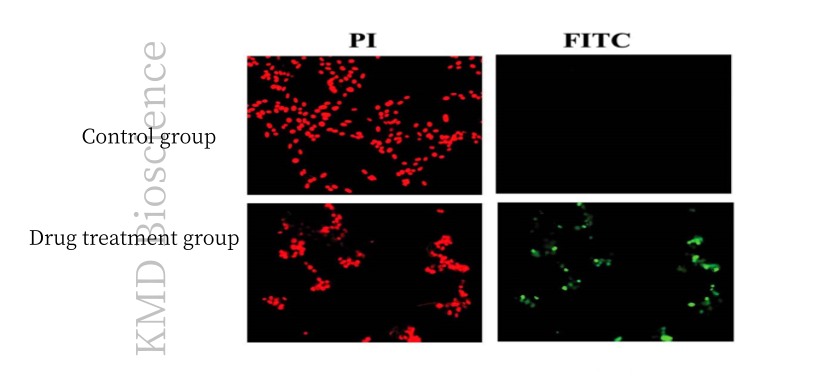Service Line:+86-022-82164980
Address:FL-4, Building A5, International Enterprise Community, Tianjin, China
Email:[email protected]
KMD Bioscience has been committed to establishing a complete cell culture platform for many years, and we can provide our customers with a wide range of basic cytology experiments. Relying on superior technical equipment and a complete platform, we can provide customers with high-quality apoptosis detection services. In addition, our laboratory has advanced systems such as immunofluorescence microscopes and flow cytometry, which can provide customers with high-quality imaging technology and add color to your research results. Depending on the customer's requirements, KMD Bioscience can establish a complete set of experimental programs, providing one-stop experimental services from cell processing and preparation, fluorescence microscope observation and photography to enhance the customer's experience.
Apoptosis (cell death) refers to the autonomous and orderly death of cells controlled by genes in order to maintain the stability of the internal environment. It plays a very important role in the embryonic development of the organism, tissue repair, and stability of the internal environment. As a basic biological phenomenon of cells, apoptosis is a kind of death process that the organism actively strives for in order to better adapt to the survival environment, and it is a highly organized, genetically controlled process with the participation of a series of enzymes. It involves the activation, expression, and regulation of a series of genes, etc. The general process consists of 4 stages, namely: induction initiation, intracellular regulation, implementation, and phagocytic transport of apoptotic cells. The apoptosis assay service provided by KMD Bioscience can be used to detect the status of apoptosis and analyze the proportion of apoptotic cells of different types and periods. The apoptosis assays are different for different periods of apoptosis.
The apoptosis assay provided by KMD Bioscience is based on the method of "PI and Annexin-V", which is a Ca2+-dependent phospholipid-binding protein with a molecular weight of 35-36KD that binds specifically and with high affinity to Phosphatidyl serine (PS). In normal cells, PS is distributed only on the inner side of the lipid bilayer of the cell membrane, while in the early stage of apoptosis, the PS in the cell membrane is flipped from the inner side to the outer side of the lipid membrane, so Annexin V becomes one of the sensitive indicators for detecting early apoptosis. We labeled Annexin V with fluorescein and used the labeled Annexin V as a fluorescent probe to detect the occurrence of apoptosis using fluorescence microscopy or flow cytometry. Propidium Iodide (PI) is a nucleic acid dye that does not pass through intact cell membranes, but for cells in the middle and late stages of apoptosis and dead cells, PI can pass through the cell membrane and stain the nucleus red. Therefore, the Annexin V-PI double labeling technology will be used to distinguish cells in different apoptotic periods. Meanwhile, relying on its own immunofluorescence imaging platform, KMD Bioscience can provide customers with high-quality image data.
|
Project |
Apoptosis Detection Service |
|
Experimental Principle |
* At the early stage of apoptosis, PS located on the inner side of the cell membrane migrates to the outer side of the cell membrane. Annexin V is a calcium-dependent phospholipid-binding protein that has a high binding affinity for PS. Therefore, Annexin V can be used as a probe to detect PS exposed on the outside of the cell. therefore, using Annexin V, which has a high affinity for PS, Annexin V can be labeled with a fluorescein (e.g., fluorescein isothiocyanate FITC), and apoptotic cells can be detected by flow cytometry. And the PI dye can bind to intracellular DNA and distinguish between necrotic and living cells. The cell membrane of early apoptotic cells and living cells is still intact, so PI dye cannot freely pass through the cell membrane into the cell and bind to DNA, so PI dye cannot label apoptotic cells and living cells, while PI dye can pass through the cell membrane of necrotic cells and bind to DNA inside the cell, and PI dye inside the necrotic cells will emit red fluorescence after excitation by the 488nm laser, which will be received by the corresponding channel. Therefore, Annexin V and PI can be used simultaneously to distinguish between live cells, early apoptotic cells and necrotic cells. |
|
Appliance |
Apoptosis assays can be applied to:
* Research on different kinds of pathological specimens including tumor cells and tissues
* Clinical diagnosis and treatment, new medcine development, biologics development, tumor radiotherapy, and gene therapy of tumors from a pro-apoptotic perspective
* Early detection of related diseases, and evaluation of the efficacy of radiotherapy. |
|
Step |
Time |
|
Material development |
1 week |
|
Medcine treatment |
1-2 weeks |
|
Material Dyeing |
|
|
Fluorescence imaging or flow cytometry |

--Ensure cell viability and produce high-quality cell crawls.
--Skilled level of experimental operation and perfect experimental procedures, with a wealth of knowledge on cell research, which can ensure that the test results are objective and accurate.
--Provide detailed and complete experimental reports, including the original results of the experiment and each experimental parameter, which can be directly used for thesis writing.
--Complete instrument platform: we have important instruments such as multi-type microscopes and flow cytometers with high resolution, which can save precious samples and obtain detailed data at the same time.
--Provide one-stop technical services such as cell culture, cell staining, and photo taking.

How to Order?

If you are interested in our service offerings, please directly call the hotline at+86-400-621-6806 or send an email to [email protected]